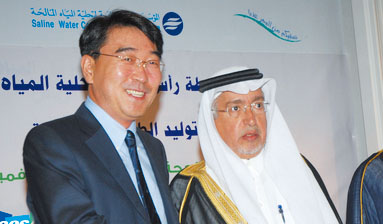Doosan Strives for Fortune Global 300 in 2020
Expanding its business environs to water treatment and other green energy sectors as growth engines


The Doosan Business Group plans to nurture as its grown engines such green energy areas as wind power, water treatment and carbon credit. These all have something in common -- they are eco-friendly industrial sectors for preventing environmental pollution and conserving energy in which the group may have synergetic effects by making the most of its strong points in the heavy industrial sector.
Doosan Heavy Industries and Construction Co. sets its sights on posting 30 trillion won in annual sales by 2020 and joining the ranks of the Fortune Global Top 300 Companies by fostering such green areas as water treatment on top of its mainstay sectors -- power plant equipment and desalination plants.
Doosan Heavy, which entered the global desalination plant market in the late 1970s, has built a world-class competitive edge through the development of new technology, the reduction of delivery time and the improvement of quality by competing with European, Japanese and other global players. Entering the 2000s, Doosan has risen to the global top with a market share of 40 percent as the company has swept almost all desalination plant orders from the Middle East, including the Fujairah power and desalination plant project in the United Arab Emirates and the Shoaiba power and desalination plant project in Saudi Arabia.
Doosan has landed 23 power and desalination plant projects from the Middle Eastern region over the past 30 years with a combined desalination capacity of 5.5 million tons, the equivalent of a day's worth of water for 15 million people. Based on its competitive edge in the desalination field, Doosan is turning its focus on the water treatment sector, purifying sewage and wastewater for household or industrial use.
POTENTIAL FOR WATER TREATMENT -- The size of the global water treatment market is estimated at approximately $3.3 billion, and the market is forecast to surge to $10 billion in 2015 with an estimated annual average growth rate of 15 percent.
Doosan Heavy is eyeing becoming a world-class total water solution provider by tapping the water-related industries, which are emerging as the so-called Blue Ocean markets of the 21st century.
Doosan landed a project to build three offshore wind power systems at the Shinan Wind Power Complex in Jeollanam-do last year. The company obtained certification on a 3MW-class wind power system from the German globally-renowned wind power accreditation agency, DEWI-OCC. There are only a few developers of wind power systems with a capacity of more than 3MW, including Vestas of Denmark and Siemens of Germany.
Doosan plans to secure a track record of performance and confidence in the wind power field by operating a 3MW-class wind power plant test bed that it will set up in the sea off Weoljeong, Jeju Island, in the second half of this year for the first time in Korea.
When it comes to the wind power field, Doosan is a latecomer, but it has strong points on which to capitalize, such as marketing, design, manufacturing and the quality knowhow it has accumulated for the past 30 years as a global power plant builder. The company has the potential to become a leader in the field along with GE and Siemens, which have become frontrunners even though they are also latecomers, company officials said.
Doosan is aggressively working on the development of carbon capture & storage (CCS) technology for reducing greenhouse gas emissions at thermal power plants. Half of all new coal and gas-fired power plants to be built during the post-Kyoto Protocol period between 2013 and 2017, which is estimated to total between 80GW and 100GW annually, are to employ the CCS technology fully or partly. It translates into a goose that will lay golden eggs with the size of the market estimated at somewhere between 50 trillion won to 60 trillion won per annum.
The company aims to land new orders worth more than $1 billion annually from the CCS technology field. Doosan Infracore's representative future growth engine is the hybrid excavator. The subsidiary of the Doosan Business Group aims to mass-produce hybrid excavators by 2014. The next-generation excavator is additionally attached to diesel engines, generators and other electric power storage systems to supplement electricity being stockpiled with waste power caused by the idling and decelerating of engines. The next-generation excavator would save some 20 million won each in fuel costs annually by reducing CO2 emissions by 35 percent and improving fuel efficiency by 35 percent, Doosan Infracore officials said. nw
Doosan Heavy Industries and Construction Co. has made a strong showing in the global desalination plant market, particularly in the Middle East, and the company is turning to expanding its business environs to the green energy sector. Seen here is the company's signing of a contract to build the Ras Az Zawr desalination plant in Saudi Arabia last November.
Photos on Courtesy of Doosan
3Fl, 292-47, Shindang 6-dong, Chung-gu, Seoul, Korea 100-456
Tel : 82-2-2235-6114 / Fax : 82-2-2235-0799